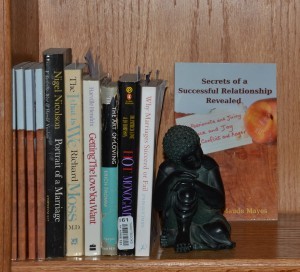Maude Mayes's Blog: Secrets of a Successful Relationship Revealed, page 108
August 16, 2015
What Makes a Relationship Work? The Three A’s
 The Three A’s:
The Three A’s:Acceptance, Acknowledgment, Appreciation
I believe the greatest gift I can conceive of having from anyone is to be seen by them, heard by them, to be understood and touched by them. The greatest gift I can give is to see, hear, understand and to touch another person. Virginia Satir
The three A’s are the glue that hold people together. They are the underpinning of any successful relationship.
Phil: A key part of a successful relationship is accepting the other person for who they are, rather than complaining and trying to change them.
Maude: Acceptance involves the true understanding that you and your partner are separate individuals, and yet can reach the heights of union together. By honoring and respecting the differences between you, and at the same time knowing your partner does the same, you can achieve a free undefended way of being together which is imbued with peace and love. We have written a number of blogs on what we call The Spectrum of Acceptance, and on Core Values so necessary to achieving this kind of acceptance. (See links below).
Phil: But beyond just accepting our partner’s qualities, we also appreciate them. That, after all, is why we choose the people we do: because we like them, like what they do, like how they speak or dress or think or dance of laugh. If you don’t appreciate your partner, that is to say that they are nothing special to you. Please don’t let that be the case. Instead, think about what qualities attract you. You may not at first be fully conscious of these attractions, but by making them clear to yourself, they will fill you with appreciation.
Maude: Acceptance is the groundwork for a successful relationship, but it is not enough on its own. The more you accept your partner for who they truly are, the more you will come to appreciate them. Appreciation is a food that all of us yearn for, and a balm to our inner being. It goes beyond acceptance to a real pleasure in the other person. As you celebrate the uniqueness of your partner, your bond will grow stronger and feed your union.
Phil: And once you are aware of these attractions? Why, acknowledge them, of course! By speaking them out loud, you affirm them to yourself, but far more importantly, you let your partner know. It is an act of intimacy. It makes your partner feel good. Such expressions of acceptance make the freedom you are offering to your partner explicit, and make a space in the world wherein they can fully be themselves.
Maude: Appreciation is a joyful experience, but if you do not communicate your feelings to your partner, they will have no idea of how you feel. Offering acknowledgment is a practice that we all need to cultivate. It would be great if we experienced this in our early years and developed a natural way of incorporating it into our behavior. Unfortunately, many people do not gain this experience and it becomes necessary to learn how to do it. Don’t keep it to yourself, put it into words and put it into actions. You will enjoy both the expressing of your appreciation, and the good feelings it engenders in your partner. Acknowledgment of your acceptance and appreciation creates opportunities for deep intimacy and is its own reward. Try it and you will rejoice at your experience!
Core Values
Core Values and The Spectrum of Acceptance
Can This Relationship Work? Learn More About the Spectrum of Acceptance
This dialog style is a new form of writing our blogs. Leave a comment and tell us how you like it.
01
August 13, 2015
Relationship Reading Corner
 We pick out and share with you various articles and blogs on relationships written by a wide variety of authors in the field.
We pick out and share with you various articles and blogs on relationships written by a wide variety of authors in the field.
We’ve been writing about core values, and found some really good posts for the Reading Corner for this week:
The Love Doctor on Archetype, Core Values and Relationships
Understanding Your Core values in Relationships
22
August 9, 2015
What’s at the Core of Your Relationship?
 We’ve talked about the importance of having aligned core values for a successful relationship. Breaking this down further, you can think of core values at two levels: universal and individual.
We’ve talked about the importance of having aligned core values for a successful relationship. Breaking this down further, you can think of core values at two levels: universal and individual.
Universal core values are based on the understanding that we are all related, all equal, all brothers and sisters.
Quite a lot of your reality is your internal landscape of thoughts, desires, goals and views. The same is true for everyone else, hard though that may be to fully appreciate. Every person has their own internal world, just as rich to them as yours is to you.
Understanding this is critical to respecting the sacrosanct nature of every personality. It helps you to understand why you should not impose your will on any other – not try to manipulate, change, better or in any way interfere with the uniqueness of another individual. Respect for the other, honoring the difference, and celebrating the difference is critical to any successful relationship.
We regard this as a universal core value. Also called the Golden Rule, every major religion and philosophy has a version of this rule.
Individual core values are what people see as important in their daily lives and in their relationships. They will vary according to each person, reflecting, for example, choices of religion, philosophy, politics and relationship to the environment. They come from our background, families, communities, and various other elements of the outside world. As we grow, have our own experiences, and come to know ourselves better, these individual core values will align more and more with universal values.
August 5, 2015
Relationship Reading Corner
 We pick out and share with you various articles and blogs on relationships written by a wide variety of authors in the field.
We pick out and share with you various articles and blogs on relationships written by a wide variety of authors in the field.
Here are our picks for the Reading Corner for this week:
The Power of Emotional Presence in Relationships
August 1, 2015
Do You Want this Relationship to Work? Intention Is a Key to Success
 An important element in accepting your partner and finding a loving connection is your intention. You have to have the intention to find peaceful harmonious ways of being together, and this has to be something that is a guiding principle and a true value to you.
An important element in accepting your partner and finding a loving connection is your intention. You have to have the intention to find peaceful harmonious ways of being together, and this has to be something that is a guiding principle and a true value to you.
When this is your goal and desire, then you will tend to use “positive viewing” to read your partner’s words and actions. If your focus is on seeing the good in your partner, you will be more apt to listen and interact from that baseline. When both of you are doing this it fosters the experience of being on the same side that is so critical to creating mutual solutions.
In our interviews with couples, they frequently reported being tired of drama in other relationships, of not wanting drama anymore. Many of them began their relationship with a clear intention to be lighter, to use humor and to seek a generally peaceful togetherness.
The intention toward a peaceful union creates an open and undefended state which allows a much freer communication and a generally heightened state of joy.
July 30, 2015
Relationship Reading Corner
 We pick out and share with you various articles and blogs on relationships written by a wide variety of authors in the field.
We pick out and share with you various articles and blogs on relationships written by a wide variety of authors in the field.
Here are our picks for the Reading Corner for this week:
Relationships Improve When You Start With You
Can Laughter Make Us Better at Relationships?
4 Ways to Be a Better Listener For Your Spouse
July 26, 2015
Do You Want to Have a Good Relationship?
 Do you want to have a good relationship? Of course everybody says yes. But do you intend to have a good relationship? What does that even mean?
Do you want to have a good relationship? Of course everybody says yes. But do you intend to have a good relationship? What does that even mean?
It has to do with how you perceive a relationship ought to be, and whether you try to move in that direction at all times.
Imagine that you’re having an argument. At any point, you can say or do things that make it worse, that you will regret the next day (or maybe forever), or you can go in another direction. I’m not talking about mollifying your partner or avoiding hard truths. Sometimes they have to be said, as things cannot move on without them being expressed, but these are not the kind of words that are regretted the next day, because they are truths.
But it’s not just with events of disagreement that you should intend for the relationship to be good; this should be your daily practice. It is the difference between driving hands-off and steering the vehicle. What does a good relationship mean to you? Steer towards it.
We’re not talking here about major production; no weekends in Paris are called for. Small changes alone suffice to make a difference; each positive event creates a positive response, and the relationship can take an entirely different course, just as surely as the opposite exchange of negative responses spiral into disaster.
So don’t just hope that your relationship is good; make the choice that it will be so.
July 21, 2015
Acceptance Does Not Mean Compromise
 Often when people think about the issue of acceptance, they think it is about compromise. Compromise is an act of giving up something to get something else. It assumes that there are different sides, and that one must settle in order to avoid conflict. It does not allow for the possibility that a resolution can be found; a resolution where, instead of giving up or changing something, you can create a solution that was not originally imaginable to either person. Without putting down compromise or its benefits, we are discussing a different path; one that is not about giving up on some part of yourself, your wants and perhaps even needs, but rather a path that by acting in union, allows you to find new mutual solutions.
Often when people think about the issue of acceptance, they think it is about compromise. Compromise is an act of giving up something to get something else. It assumes that there are different sides, and that one must settle in order to avoid conflict. It does not allow for the possibility that a resolution can be found; a resolution where, instead of giving up or changing something, you can create a solution that was not originally imaginable to either person. Without putting down compromise or its benefits, we are discussing a different path; one that is not about giving up on some part of yourself, your wants and perhaps even needs, but rather a path that by acting in union, allows you to find new mutual solutions.
Excerpt from our forthcoming book How Two: Have a Successful Relationship
This is a rich topic that has led to many interesting conversations in our interviews with couples. Learning how to find mutual solutions without giving anything up is a wonderful process that strengthens the union between a couple. The almost magical experience of co-creating something new, that is different and better than what either partner had individually, opens up an area that carries over into every aspect of the relationship. This new type of acceptance is a joyful enrichment of every relationship and follows directly on the practices of the Spectrum of Acceptance.
Click on the link in the upper right corner of this page to receive an audio and written version of a chapter from our new book that describes a process which promotes creating mutual solutions. We would love to hear about your experiences and feedback!
July 12, 2015
Can This Relationship Work? Learn More About the Spectrum of Acceptance
 In our last blogs we’ve been talking about the Spectrum of Acceptance and Core Values which lie at one end of the spectrum.
In our last blogs we’ve been talking about the Spectrum of Acceptance and Core Values which lie at one end of the spectrum.
Next on the spectrum are the areas of middle ground. These are places of divergence between you and your partner that have the potential of resolution. The process of finding mutual solutions and accepting differences that do not challenge basic values can be a rich area of growth for a relationship. Communicating as two people who are on the same side can produce wonderful experiences of closeness and union.
These middle spectrum areas can be problems and decisions like where to go on a trip, how to deal with each other’s parents or children, how to furnish shared space, or how to spend leisure time, whether to go out or stay in, how much to socialize with others – alone or together, Whatever these are for you, the situations provide fertile areas for really coming to know each other, accept each other, and find ways to new mutual solutions together.
In our forthcoming book, How Two: Have a Successful Relationship, we share a simple process for finding these solutions. Click on the link to the right where you can sign up for our newsletter and get that chapter from our new book on this helpful process in both written and audio form.
July 4, 2015
Core Values and The Spectrum of Acceptance
 Along with a discussion of core values, it is important to talk about The Spectrum of Acceptance. When we talk about successful relationships, we describe actions and values as lying along a spectrum. At the top end of this spectrum are your deal breakers; areas of meaning and value that you consider to be core to your life. These can be areas like honesty, fidelity, responsibility, they vary for each person, but we all have these core values.
Along with a discussion of core values, it is important to talk about The Spectrum of Acceptance. When we talk about successful relationships, we describe actions and values as lying along a spectrum. At the top end of this spectrum are your deal breakers; areas of meaning and value that you consider to be core to your life. These can be areas like honesty, fidelity, responsibility, they vary for each person, but we all have these core values.
The more you have come to know yourself, the clearer you will be on what these are. There are also primary areas of your world view, like religion and philosophy, political and economic alignment, child-rearing issues, your relation to the community at large; all these are also basic values that are probably deal breakers for most of us.
It is important to assess whether you and your perspective partner mesh and are aligned, and to allow time to experience if their words match their actions. Do not be too hasty in your assessment of these areas. However, once you have made a determination, if there are true breaches with your inner compass, this is a relationship that will not work. Get out before you get in too deeply.
If after these evaluations, you are planning to move forward with a relationship, then the other two areas of The spectrum of Acceptance become important.
But that is for another day, and another blog!
Secrets of a Successful Relationship Revealed
We use this blog to continue the exploration of the magic that can be found in a relationship, and the wider implications of peace for the world. ...more
- Maude Mayes's profile
- 8 followers



